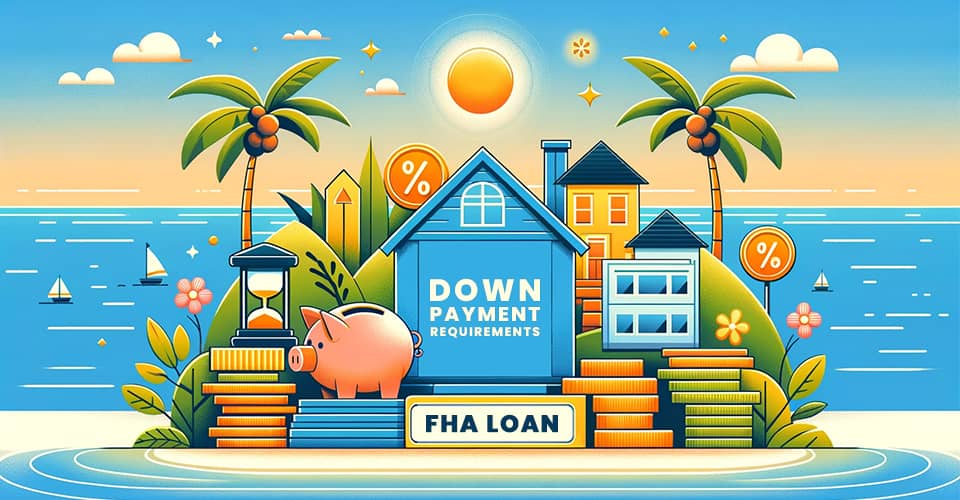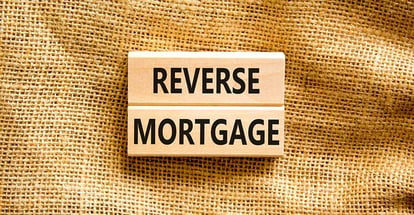FHA Loan Down Payment Requirements in Florida
We aim to equip you with the knowledge to confidently approach FHA loans and make well-informed decisions in your home-buying journey.
Table of Contents
What Are the FHA Loan Down Payment Requirements in Florida?
When purchasing a home in Florida using an FHA loan, one of the primary considerations is the down payment requirement. A down payment is a significant upfront payment representing a portion of the home's purchase price.
The Federal Housing Administration (FHA) sets specific guidelines for down payments on FHA loans, popular among many homebuyers, particularly first-timers, due to their lower entry barriers than conventional loans.
For most borrowers in Florida, FHA loans require a down payment of as low as 3.5% of the home's purchase price. This rate applies to buyers with a credit score of 580 or higher.
For example, if you buy a home priced at $250,000, and your credit score is at least 580, your minimum down payment would be $8,750.
However, it's important to note that the down payment requirement can vary based on credit history and other personal financial factors.
The FHA loan program is designed to assist a wide range of borrowers, including those with less-than-perfect credit histories, offering an accessible route to homeownership.
Influence of Credit Score on Down Payment Amount
The down payment requirement for an FHA loan in Florida is closely tied to the applicant's credit score. Borrowers with higher credit scores are generally required to make a smaller down payment. As mentioned, a credit score of 580 or more qualifies you for the minimum down payment of 3.5%.
On the other hand, if your credit score falls between 500 and 579, the FHA requires a larger down payment of 10% of the home's purchase price.
Continuing with the previous example, a home priced at $250,000 would mean a down payment of $25,000, which is significantly higher than what is required for those with better credit scores.

Additional Financial Obligations with FHA Loans
When obtaining an FHA loan in Florida, it's important to account for closing costs, which are additional expenses over and above the down payment.
Typically, FHA closing costs range between 3% and 6% of the home's purchase price. These costs cover various charges associated with finalizing a mortgage, such as appraisal fees, title insurance, attorney fees, and loan origination fees.
For instance, if you're purchasing a home in Florida for $250,000, you can expect to pay between approximately $7,500 to $15,000 in closing costs.
This is significant and should be factored into your overall budget when planning for a home purchase. Borrowers need to get an estimate of these costs early in the home-buying process to avoid any surprises at closing.
FHA Mortgage Insurance Premiums: Upfront and Annual
In addition to the down payment and closing costs, FHA loans in Florida also require the payment of a Mortgage Insurance Premium (MIP). This insurance is a standard requirement for FHA loans and protects the lender in case the borrower defaults on the loan.
The FHA MIP comprises two parts: an upfront premium and an annual premium. The upfront MIP is 1.75% of the total loan amount. A $250,000 loan would amount to an upfront payment of $4,375. Borrowers can pay this upfront cost at closing or roll it into their mortgage balance.
Alongside the upfront premium, there's an annual MIP, typically included in your monthly mortgage payments. The exact amount of the annual MIP depends on factors such as the loan length, the amount borrowed, and the initial loan-to-value ratio.
This ongoing cost is an important consideration for long-term budgeting as it will affect your monthly mortgage payments for a significant period.
FHA Gift Rules and Donor Guidelines in Florida
For many homebuyers in Florida, accumulating enough funds for a down payment can be a challenge. The FHA loan program addresses this by allowing gift funds to be used towards the down payment and closing costs.
This flexibility can significantly aid buyers who might otherwise struggle to accumulate the necessary funds independently.
Gift funds for FHA loans must come from acceptable sources, as defined by the FHA. These sources include:
-
Family Members: A borrower's immediate family member, such as a parent, grandparent, or sibling, can provide gift funds.
-
Employers or Labor Unions: An employer or a borrower's labor union can also gift funds.
-
Close Friends: The FHA permits gifts from close friends with a clearly defined interest in the borrower.
-
Charitable Organizations: Recognized charitable organizations can provide gift funds.
- Governmental Agencies: Governmental agencies offering assistance to low- or moderate-income families or first-time homebuyers can also be sources of gift funds.
It's essential for borrowers to properly document the gift funds to ensure they meet FHA guidelines. This includes providing a gift letter that states the relationship between the donor and the recipient, the amount of the gift, and the statement that no repayment is expected.
Restrictions on Gift Fund Sources
While the FHA loan program is flexible regarding gift funds, there are specific restrictions to prevent conflicts of interest and ensure the integrity of the loan process.
Gift funds for an FHA loan cannot come from parties with a vested interest in selling the property. This includes:
-
The Property Seller: The individual or entity selling the property cannot provide gift funds.
-
Real Estate Agents or Brokers: Agents involved in the home-buying transaction are prohibited from giving gift funds.
-
The Lender: Lenders providing the FHA loan cannot also supply gift funds.
- Home Builders: Builders selling the property are not allowed to give gift funds to the buyer.
FHA Loan Vs. Conventional Loan Requirements
The minimum credit score required for FHA loans depends on the down payment amount. A credit score of 580 or higher allows for a minimum down payment of 3.5%. However, if a buyer's credit score is between 500 and 579, the FHA requires a larger down payment of 10%.
In contrast, conventional loans typically require a higher credit score. For a conventional mortgage with a low down payment option (as low as 3%), a credit score of 620 or more is generally required.
Borrowers with lower credit scores may still be eligible for a conventional loan but might face higher interest rates or a requirement for a larger down payment.
The down payment is another critical factor when comparing FHA and conventional loans. As mentioned, FHA loans offer a minimum down payment of 3.5% for credit scores of 580 or above.
This relatively low down payment requirement makes FHA loans particularly appealing to first-time homebuyers or those with limited savings.
On the other hand, conventional loans offer down payments as low as 3%, but this is typically available only to borrowers with higher credit scores (usually 620 or above). The down payment requirement can vary based on the borrower's credit score and the lender's policies.
In summary, FHA loans are more accessible for those with lower credit scores or less savings for a down payment.
In contrast, conventional loans may offer lower down payments for those with higher credit scores, but they generally have stricter credit and down payment requirements than FHA loans.
Florida Down Payment Assistance Programs for FHA Loans
Florida offers a variety of down payment assistance programs in 2024, specifically tailored to aid first-time homebuyers in achieving their dream of homeownership.
These programs are designed to provide financial support through cash grants, reduced mortgage rates, and more lenient lending criteria, making the home-buying process more accessible and affordable.
-
Florida Hometown Heroes Program: This program offers up to $35,000 in assistance for down payments, closing costs, and lower mortgage interest rates. It's aimed at first-time, income-qualified homebuyers who contribute to their Florida communities through their work or service. Applicants must meet certain income limits and have a minimum credit score of 620.
-
Good Neighbor Next Door (GNND) Program: This HUD initiative provides a significant discount of 50% off the list price of homes in designated revitalization areas for eligible public service professionals. Participants must commit to using the home as their primary residence for at least 36 months.
-
VA Mortgage: Available to military members, veterans, and their spouses, VA mortgages offer 100% financing without needing mortgage insurance. They require a minimum credit score of 620.
-
USDA Mortgage: Ideal for homes in rural areas, these mortgages offer 100% financing for buyers with a minimum credit score of 580.
-
FHFA First-Time Home Buyer Discount: This program offers a discount on interest rates for eligible first-time homebuyers using a conventional 30-year fixed-rate mortgage. The discount can be up to 1.75 percentage points, potentially reducing monthly payments by up to 20%.
-
The National Homebuyers Fund: Offers cash grants up to 5% of the purchase price, with eligibility conditions including a five-year residency requirement.
-
Forgivable Mortgages: These loans are forgiven after the homeowner meets certain conditions, such as residing in the home for a specified period, usually five years.
-
Discounted Homes from HUD: The GNND program offers repossessed homes at a 50% discount to first-time buyers who are public service professionals.
-
Down Payment Loans: Low-interest loans provided by non-profit and community organizations to cover the down payment.
- Deferred Mortgages: Allow repayment to be delayed until the home is sold or refinanced, often provided by municipal governments and local foundations.
Florida FHA Loan Down Payment FAQs
This section addresses some of the most common inquiries about FHA loan down payments and the overall qualification process for these loans in Florida.
-
How much is the minimum down payment for an FHA loan? For FHA loans, the smallest down payment is typically 3.5%, available to those with a credit score of 580 or above. If your credit score ranges between 500 and 579, expect to make a larger down payment of 10%.
-
What qualifications are required for an FHA loan? To qualify for an FHA loan, applicants must meet several criteria: a debt-to-income ratio under 45%, proof of income (like pay stubs and tax returns), the loan amount must adhere to FHA loan limits, the property should be a primary residence, and an FHA-approved appraiser must appraise it.
-
Can FHA loan applicants benefit from seller concessions? Yes, buyers using an FHA loan can request seller concessions. The seller may agree to pay up to 6% of the home sale price towards the buyer's closing costs.
-
What other mortgage options offer low down payments? Beyond FHA loans, there are other low-down-payment options like VA and USDA loans, which can offer down payments as low as 0% for eligible borrowers. Additionally, programs like Freddie Mac’s Home Possible® and Fannie Mae’s HomeReady® allow down payments as low as 3%.
-
Are there specific income requirements for FHA loans? While FHA loans don't have a set income threshold, applicants must demonstrate the ability to repay the loan. Lenders will evaluate income stability and the debt-to-income ratio to ensure affordability.
-
Can FHA loans be used for any type of property? FHA loans are generally for primary residences only. They cannot be used for investment properties or vacation homes.
-
How does the FHA loan process differ from conventional loans? The FHA loan process is typically more accommodating for borrowers with lower credit scores and offers more flexibility in debt-to-income ratios than conventional loans.
-
What happens if I default on an FHA loan? Defaulting on an FHA loan can lead to foreclosure. However, the FHA offers options like loan modifications or short sales to help struggling borrowers.
-
Is mortgage insurance required for all FHA loans? Yes, all FHA loans require mortgage insurance, including an upfront and annual premium.
- Can non-U.S. citizens apply for an FHA loan? Non-U.S. citizens can apply for an FHA loan if they meet specific eligibility criteria, such as having a valid Social Security number, lawful residency in the U.S., and a record of steady employment.
With over 50 years of mortgage industry experience, we are here to help you achieve the American dream of owning a home. We strive to provide the best education before, during, and after you buy a home. Our advice is based on experience with Phil Ganz and Team closing over One billion dollars and helping countless families.

About Author - Phil Ganz
Phil Ganz has over 20+ years of experience in the residential financing space. With over a billion dollars of funded loans, Phil helps homebuyers configure the perfect mortgage plan. Whether it's your first home, a complex multiple-property purchase, or anything in between, Phil has the experience to help you achieve your goals.


 By
By  Edited by
Edited by 






